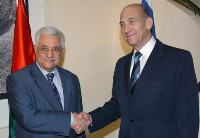Israeli Prime Minister and military commanders discuss how to respond to rocket barrage by Hamas
Prime Minister Ehud Olmert called a meeting of military commanders and security advisers to discuss how to respond to the first rocket barrage by Hamas militants since the two sides reached a truce five months ago.

Olmert spoke to his defense minister, Amir Peretz, after the Tuesday barrage and planned to hold further consultations Wednesday morning, Israeli officials said. The issue was whether to resume pre-emptive attacks against Palestinian militants in the Gaza Strip. The rising tensions have left the future of the truce in doubt.
Deputy Defense Minister Ephraim Sneh said Israel was not seeking to raise the level of conflict between the two sides and security officials said a full-scale ground offensive into Gaza was not a preferred option.
"We have no interest in escalation," Sneh told Israel Radio. "We do have an interest in doing what is necessary to reduce as much as possible the level of terrorism."
The head of an Egyptian security delegation in Gaza, Maj. Gen. Burhan Hamad, called a meeting of all Palestinian factions Wednesday morning, urging them to maintain the calm "to avert any possible Israeli invasion of Gaza."
He condemned the rocket barrages, as well as Israeli raids earlier in the week that killed nine Palestinians, most of them militants. Egypt frequently acts as a mediator between Israel and Palestinian militants.
Hamas is a partner in the Palestinian coalition government, whose platform calls for a long-term truce with Israel.
But after the Israeli raids this week, Hamas called for a renewal of attacks on Israel. On Tuesday, the Islamic militant group said its members fired 41 rockets and 54 mortar shells on Tuesday in response to the Israeli raids.
The Israeli military said it could confirm the launching of only six rockets and eight shells. Just two rockets reached Israel, causing no casualties or injuries, the army said.
Israeli media, citing military officials, said the rocket bombardment apparently had been intended to create a diversion in order to capture an Israeli soldier near the Gaza border. The military refused to comment on the reports.
Hamas-linked militants have been holding a 20-year-old Israeli corporal, Gilad Shalit, captive since capturing him in a cross-border raid last June.
Olmert and Palestinian President Mahmoud Abbas announced the Gaza truce in late November, declaring an end to Palestinian rocket fire and Israeli attacks, including airstrikes at Gaza militants and invasions of towns in northern Gaza.
Israel has stopped most of military activity but kept Gaza in a stranglehold by frequently closing its vital border crossings, citing security threats. While Hamas rocket squads stayed on the sidelines, other groups, like Islamic Jihad, have kept up fire of homemade rockets almost daily at Israeli towns and villages just outside Gaza.
Tuesday's rocket barrage, coinciding with Israeli Independence Day, was the first sign Hamas was backing away from the truce.
"The cease-fire has been over for a long time, and Israel is responsible for that," Hamas spokesman Abu Obeida, told the Voice of Palestine radio station.
On a visit to Rome, Abbas called on Israel to "exercise the necessary self-control" and said the "truce violation is an exceptional act which will not last."
Palestinian Prime Minister Ismail Haniyeh of Hamas appeared to defend the attack. "We made great efforts at keeping the truce and there was a positive Palestinian position, but unfortunately this position was met by expanding (Israeli) aggression and escalating it against the Palestinian people," he said.
Haniyeh's spokesman, Ghazi Hamad, also blamed Israel, but said the Palestinian government "affirms the importance of maintaining the truce and protecting it."
Peretz told Israel Radio late Tuesday that the Hamas claim of responsibility for the rockets attack was "a very serious matter, and we will have to deal with it."
Also Wednesday, the army ended a general closure of the West Bank and Gaza Strip. The closure, put in place on Sunday for Israeli Memorial Day and Independence Day, had barred virtually all Palestinians from entering Israel. Thousands of Palestinians enter Israel each day for work, medical care and family visits.
Subscribe to Pravda.Ru Telegram channel, Facebook, RSS!


